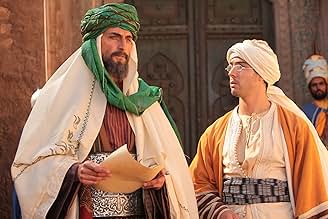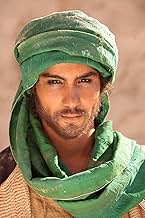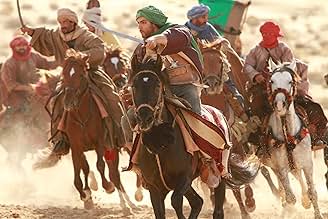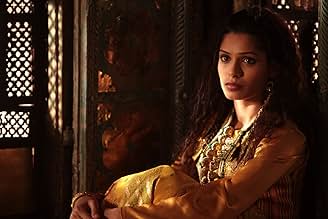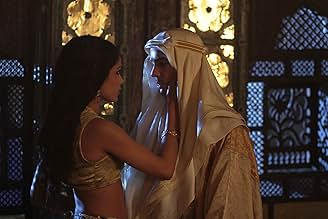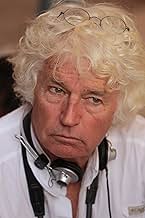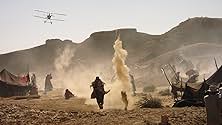Set in the 1930s Arab states at the dawn of the oil boom, the story centers on a young Arab prince torn between allegiance to his conservative father and his modern, liberal father-in-law.Set in the 1930s Arab states at the dawn of the oil boom, the story centers on a young Arab prince torn between allegiance to his conservative father and his modern, liberal father-in-law.Set in the 1930s Arab states at the dawn of the oil boom, the story centers on a young Arab prince torn between allegiance to his conservative father and his modern, liberal father-in-law.
- Awards
- 1 nomination total
Featured reviews
Directed by Jean-Jacques Annaud Set in the 1930s Arab states at the dawn of the oil boom, the story centers on a young Arab prince torn between allegiance to his conservative father and modern, liberal father-in-law (plot), it is the highest budget Arabian related film since LAWRENCE OF ARABIA (1962) and was one of the most anticipated film events in the international film community this season, despite the hype, however, the film was met with mixed reviews after the press screening and premier. Expectations were high and while many were left dissatisfied, others rated it a smashing success as it apparently followed the book to a tee, I have not read the book so perhaps I am missing something, but being that I have seen a number of impressive films of late that were made for under the $1 million mark, BLACK GOLD felt like a significant letdown with its $55 million production price-tag and lackluster deliverance.
The highlight of the film was a fantastic performance by lead role Tahar Rahim (A PROPHET, 2009), his soulful eyes and magnetic vulnerability can work in any film whether speaking or just looking into the camera sans dialogue. Mark Strong also plays a great bearded royal Arabian Sultan Amar, even though he speaks with a distinguishable British accent. The roles that threw the film off were those of Antonio Banderas and Freida Pinto. It is almost impossible to watch Banderas play Bedouin Sheik Nassib without constantly being reminded that he is, in fact, Antonio Banderas. Freida Pinto lends the film her stunning Indian looks as Princess Leyla, but unfortunately her dialogue consists of cliché one-liners that might have saved the movie if not uttered; of course bad film writing is bad writing however delivered.
3,5/5
The highlight of the film was a fantastic performance by lead role Tahar Rahim (A PROPHET, 2009), his soulful eyes and magnetic vulnerability can work in any film whether speaking or just looking into the camera sans dialogue. Mark Strong also plays a great bearded royal Arabian Sultan Amar, even though he speaks with a distinguishable British accent. The roles that threw the film off were those of Antonio Banderas and Freida Pinto. It is almost impossible to watch Banderas play Bedouin Sheik Nassib without constantly being reminded that he is, in fact, Antonio Banderas. Freida Pinto lends the film her stunning Indian looks as Princess Leyla, but unfortunately her dialogue consists of cliché one-liners that might have saved the movie if not uttered; of course bad film writing is bad writing however delivered.
3,5/5
Well the movie has only the best intentions I assume. It tries hard to be as politically correct as possible, while trying to show extremities and cultural differences. That doesn't work as good as the filmmakers might have expected. I think the tone is uneven, while it still may hold some surprises for some people I guess.
Some good acting is involved here and you get the beautiful Freida Pinto in a major role. You also get Riz Ahmed from Four Lions, who's repeating his comedic role (in another tone obviously, but still very funny of course). The sets are nice and you get a history lesson (more or less) from a region that some (most) of you may not know yet ...
Some good acting is involved here and you get the beautiful Freida Pinto in a major role. You also get Riz Ahmed from Four Lions, who's repeating his comedic role (in another tone obviously, but still very funny of course). The sets are nice and you get a history lesson (more or less) from a region that some (most) of you may not know yet ...
It has a good story (historically irrelevant) about the beginnings of oil exports from the middle east. The leading role is played marvelously while for some obscure reason the accompanying major characters are a bit swallow.
Other than that, it is consistent, the film and the story flow without tiring the audience and with awe inspiring scenes of desert battle.
Baring in mind that I gave a 9 to the film because I really enjoyed it and that's what films are about, I have to address the fact that either my knowledge of the Arab world is far lesser than i thought or the film for some reason follows some ill-thought clichés... Half of the people shown on the film would never pass for Arabs... really never... it's more likely that i would pass for an Arab and I'm Greek than half of the cast of the movie... moreover the "heaviness", if it can be a valid term, of the language reminds me more of Persians and less of Arabs ...
Anyways other than that, it is a good film worth seeing, it will make you worth the time.
Other than that, it is consistent, the film and the story flow without tiring the audience and with awe inspiring scenes of desert battle.
Baring in mind that I gave a 9 to the film because I really enjoyed it and that's what films are about, I have to address the fact that either my knowledge of the Arab world is far lesser than i thought or the film for some reason follows some ill-thought clichés... Half of the people shown on the film would never pass for Arabs... really never... it's more likely that i would pass for an Arab and I'm Greek than half of the cast of the movie... moreover the "heaviness", if it can be a valid term, of the language reminds me more of Persians and less of Arabs ...
Anyways other than that, it is a good film worth seeing, it will make you worth the time.
'Black Gold' is an old fashioned epic about feuding fiefdoms in 1930's Arabia, when oil had just been discovered in the region. Mark Strong & Antonio Banderas are the two rulers with a long standing rivalry that metamorphoses into a temporary truce, only to flare up again when their very divergent views inevitably come in the way. Tahar Rahim & Freida Pinto as their respective children, married to each other in what is essentially a politically motivated gesture, attempt to play the peacemakers. Performances - particularly Strong, Rahim & Pinto - are very good. Rahim, playing a Michael Corleone-ish character, does a commendable job. Pinto looks lovely, and Strong as the devout Sultan with a conscience, is nicely understated. As is customary in director Jean-Jacques Annaud's films, the locales & cinematography are breathtaking. The action sequences are crisp & filmed in a raw, realistic manner. Where the film falters, is in taking too long to tell a story that in fact needs far less time. Some passages get boring whereas others keep the viewer completely engrossed. It is this unevenness in the film's pacing that dents the possibility of it soaring high. Overall though, not a bad way to spend a couple of hours.
They don't make many movies like this anymore, it felt like somebody had discovered a lost gem from the 1970s, with real extras, real horses and real camels instead of the soulless computer copies of todays CGI productions. I loved it! Also the story remained interesting, when the Prince has a difficult decision to make whose side he'll be on.
The story apparently is not precisely following actual historical events, but takes the liberty of creating a world of the 1930s like it could have been. No maps are shown on the screen to show which army moves where, because it is the general feeling of a changing world that matters, the struggle between different attitudes, not the history lesson. I do not know why this artistic freedom is making some viewers complain. Hundreds of western movies described battles between soldiers and Indians which were only vaguely similar to actual history, so I don't think this discussion is necessary. "Black Gold" is an adventure movie, first of all. Actually, the makers balance very well between the entertainment value and ambitions beyond that, neither too heavy nor too light. A good compromise was found between a commercial approach and content that has something to say. When the oil flows over the ground, useless like a pond of black ink, one wonders: is it worth all that fighting? One review here said 'the director made a mistake, there is no pipeline', which proves that the poetry of pictures is really lost on some people. Anyway.
The makers, supported by the Emirate of Qatar, succeeded in putting the Arabs in the focus, and if the American guy from Texas Oil remains a cartoon character with a silly hat, it's hardly an accident. Best actors to me were Tahar Rahim as Prince Auda and Mark Strong as Amar, his father. Antonio Banderas, however, had a license for staring, it seems. Any time he has got a close-up without much to say: yes, he stares in an interesting way. The director could have told him him not to overdo it, but I guess it's easier said than done.
The story apparently is not precisely following actual historical events, but takes the liberty of creating a world of the 1930s like it could have been. No maps are shown on the screen to show which army moves where, because it is the general feeling of a changing world that matters, the struggle between different attitudes, not the history lesson. I do not know why this artistic freedom is making some viewers complain. Hundreds of western movies described battles between soldiers and Indians which were only vaguely similar to actual history, so I don't think this discussion is necessary. "Black Gold" is an adventure movie, first of all. Actually, the makers balance very well between the entertainment value and ambitions beyond that, neither too heavy nor too light. A good compromise was found between a commercial approach and content that has something to say. When the oil flows over the ground, useless like a pond of black ink, one wonders: is it worth all that fighting? One review here said 'the director made a mistake, there is no pipeline', which proves that the poetry of pictures is really lost on some people. Anyway.
The makers, supported by the Emirate of Qatar, succeeded in putting the Arabs in the focus, and if the American guy from Texas Oil remains a cartoon character with a silly hat, it's hardly an accident. Best actors to me were Tahar Rahim as Prince Auda and Mark Strong as Amar, his father. Antonio Banderas, however, had a license for staring, it seems. Any time he has got a close-up without much to say: yes, he stares in an interesting way. The director could have told him him not to overdo it, but I guess it's easier said than done.
Did you know
- TriviaThe film was shot in Tunisia and Qatar. The battle scenes were shot in the deserts of Qatar and took over four weeks to shoot.
- Quotes
Prince Auda: God hates the things we do in His name. He hates that.
- ConnectionsFeatured in Projector: Black Gold (2012)
- SoundtracksI'm Sitting On The Top of The World
Written by Ray Henderson, Sam Lewis and Joe Young
- How long is Day of the Falcon?Powered by Alexa
Details
- Release date
- Countries of origin
- Official sites
- Language
- Also known as
- Vàng Đen
- Filming locations
- Empire Studios, Latrach, Tunisia(Studio)
- Production companies
- See more company credits at IMDbPro
Box office
- Budget
- €40,000,000 (estimated)
- Gross worldwide
- $5,452,142
- Runtime
- 2h 10m(130 min)
- Color
- Sound mix
- Aspect ratio
- 2.35 : 1
Contribute to this page
Suggest an edit or add missing content





